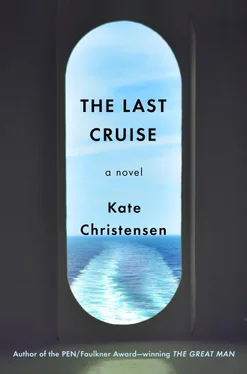“Everyone,” said Sasha. “Get your instruments out. We’re going to play Rivka’s Six-Day War Quartet that she wrote for us, in our honor.”
They set up chairs, unfolded music stands, found the sheet music.
Unsnapping her case, taking out her violin, holding it again, Miriam felt as she always did when she was about to play with the Sabra: happy, tense, grounded. Her violin smelled like sweet old wood and rich, oily rosin dust. She tightened her bow, plucked her strings, nestled her instrument between her chin and her shoulder, and held her bow lightly between her thumb and index fingertip as she tuned to Sasha’s A.
She looked around at the three others: Sasha, fierce and intent; Isaac, with his serious expression that was always half funny to her, glasses on the end of his nose; and Jakov, golden tufts of hair matted, his face distended with illness, his cello leaning against his shoulder like a small, long-necked, curvy woman, his arms and legs feebly embracing her.
They all looked over at Sasha, bows poised, waiting for his violin scroll’s slight lift and dip, which he executed now with a little quirk of his mouth as if to say, Once more into the breach, comrades.
It wasn’t the best meal in the world, but when it was over, Mick felt an unexpected sense of satisfaction. The food had disappeared as fast as the service team could dish it out. Everyone had eaten well, and they had all eaten together—walkout crew, remaining crew, bridge crew, and passengers—from the same bowls and trays of food. And he’d been told that the walkouts had helped his crew collect the paper plates and napkins and stuff them into trash bags to throw down onto the loading bay. He tried to avoid reading too much into this; their newfound willingness to cooperate might be temporary for all he knew. But he felt encouraged by it, all the same.
When the kitchen was clean and the remaining supplies from the airdrop properly stored, Mick stripped off his chef whites in the locker room. He washed and soaped himself as best he could with a two-liter bottle of water—face, armpits, groin—and wandered up in search of Christine.
It was just after sunset. A crowd had gathered in the glimmering dusk on the solarium deck at the very top of the ship. He saw people lying on deck chairs, riding the stationary bicycles, huddled on the floor, talking in small groups in low voices, cigarette ends and vaping pipes glowing. Mick spotted members of the crew among the passengers, and some of the walkouts too, including Consuelo, who sat next to Natalya over in a corner, talking to several of the younger passengers. He looked around for Christine, feeling like a stranger and an outsider.
“Hey,” came a female voice from somewhere around his knees. “Got a cigarette?”
He looked down. Valerie sat alone on the teak decking, leaning against the outer wall of the glass solarium, drinking from a wine bottle.
“Have you seen Christine?” Reluctantly, he handed her a cigarette. It was his last pack.
“No,” said Valerie. “But she’s supposed to meet me up here. Want a drink?”
He sat down next to her and took a swig while she lit her cigarette.
“So Mick,” she said, exhaling smoke. “I think we got off on the wrong foot back there. Remember when I barged into your kitchen trying to interview you?”
“I remember.”
“Seems like months ago, right? Anyway, it’s okay because I ended up talking to Consuelo, who was super nice and generous with her time, unlike someone else.” She gave him a playful nudge.
“I was working,” he said.
“So was I,” she said.
He gave her a sidelong look.
She grinned at him and cheekily plucked the wine bottle from his hand and tipped some into her mouth. “What are you going to do next? Where do you go after we get off this thing?”
Mick eased back and settled his hipbones on the deck flooring. “I’m not sure,” he said. “I’m leaving this job, that’s all I know.”
“They’re letting you go too?”
“No. Not me.”
“But you’re leaving anyway?”
“Yes,” said Mick.
“How come you don’t join the other walkouts?”
“Someone has to cook for the passengers.”
“Why not let us cook for ourselves? I’m kidding. I’m just trying to understand it from your perspective. Do you think what Cabaret is doing is wrong?”
“Of course I do,” said Mick, surprised at the strength of feeling in his own voice. “These are good workers, they’ve done a good job. They don’t deserve to be let go like this. Do you know what they sent in the airdrop today? The supplies they sent us?”
“Yeah. We were joking about that earlier. ‘Let them eat croissants.’ ”
Mick snorted. “Peanut butter, baby carrots, power bars, little boxes of apple juice, like we’re a fucking kindergarten at snack time.”
Valerie laughed. “Not to defend them,” she said, “but they were probably just trying to give us whatever was easiest to pack, the most nutritious, whatever won’t go bad right away.”
Mick shook his head. “I was hoping at least for real food, some charcoal to cook it with.”
“Aren’t you glad not to have to cook?” She passed him the bottle.
He drank, wiped his mouth on the back of his hand. “It’s much worse if I can’t work.”
“I hear you, man. Some of us need our work just to get through the day.”
“Your friend Christine’s like that too,” he said, almost as an afterthought.
“She is. I sort of expected when she moved up to the country to live on a farm, she’d relax with the work ethic, but she just channeled it into something else.”
“She’s a hard worker,” he said, feeling for some reason as if he had to defend Christine against her friend, even though Valerie hadn’t said anything overtly critical.
They were silent for a while, passing the wine back and forth, listening to the conversations around them. At some point, Mick noticed Valerie’s shoulder leaning against his. He shifted away from her to light a cigarette.
“What’s that weird music?” she said.
Mick listened. A slight breeze blew the sound to them from somewhere nearby, a spiky, atonal piece for strings, dissonant, shivery-beautiful, squawkingly ugly, terrible and gorgeous in turn.
“I don’t know,” he said.
It sounded as if the musicians were making it up on the spot. It gave Mick a complicated feeling he couldn’t name, the swirling coalescence of everything he’d been thinking about all day, as if they were playing the sound track to the inside of his head.
*
Miriam found she knew the piece almost by heart. They had rehearsed it only twice since they’d set sail, and not for days, but she must have internalized it while she wasn’t thinking about it, because her left fingers somehow suddenly knew on their own where to go on the fingerboard, her right hand knew the bowings, the rhythms and dynamics. This had always been the greatest pleasure of her life, losing herself in a piece of music she knew well enough to play without thinking. Now that she didn’t have to agonize over the score, Miriam could hear this piece for the first time as it unfolded. Now that she wasn’t counting beats and resenting the composer for her diabolical double-stops and pretentious percussive passages, she understood the way in which Rivka had written the narrative of the Six-Day War from start to finish. The first movement described the gathering threat from all sides pressing in on Israel, still vulnerable, the Jews still ragged from the Holocaust, trying to establish their young state. Jakov’s cello sent a hostile undercurrent of tremolo from Egypt as Isaac’s viola sounded Syria’s harsh war cries and Sasha’s violins squealed a warning from Jordan, the Arab countries mustering their might to vanquish and exterminate the Jews once and for all. Miriam’s second-violin part, she realized, was filled with the quiet determination of a people who had been tested to their limits and tested again, and who had survived, and would survive again. She played her part with a visceral steadiness, holding firm to her odd rhythms, her dissonant intervals a shaky inchoate tremolo growing in force, loudening, resolving into ringing double-stops.
Читать дальше












